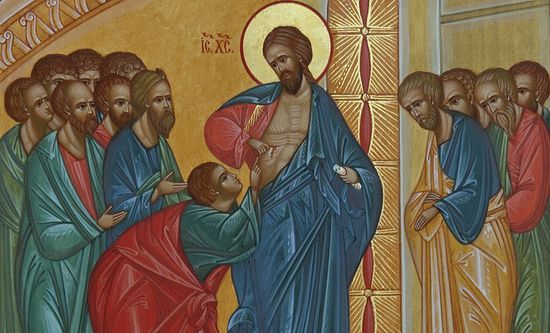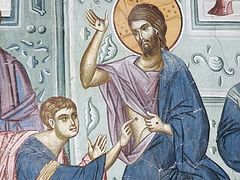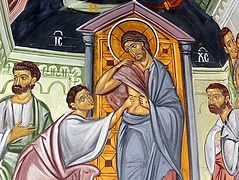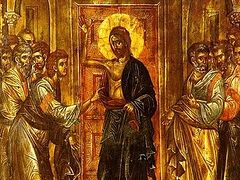In the name of the Father and of the Son and of the Holy Spirit.
More than once we read in the Gospel the solemn confession of a man who recognized in Christ His Lord and God. It happened the first time at the beginning of the Lord’s path. After His Baptism, when Christ had embarked upon the way of the Cross, He met Nathanael. Christ testified before others that he was a man pure and righteous of heart, and Nathanael asked Him: “How do you know that?” The Savior answered him with the mysterious words: Before that Philip called thee, when thou wast under the fig tree, I saw thee. Nathanael answered and saith unto Him, Rabbi, Thou art the Son of God; Thou art the King of Israel (Jn. 1:48-49).
And St. John the Forerunner says: Behold the Lamb of God, which taketh away the sin of the world!
And the healed and those who saw the numerous miracles of Christ spoke about it.
But then these testimonies somehow fade in the hearts of those who have testified to the Lord, and they fade in our hearts—all of us, like the apostles who once saw only the visible, but very slowly we begin to see the invisible and that which is hidden in Christ.
We follow Christ, but like His apostles, we are still prone to doubt; like them, we don’t trust Him, that He can safely deliver us from the danger of death, from the dangers of this temporal life.
Like Thomas the Apostle, whose name was the “Twin,” or, as some commentators have explained it, meaning a person of dual nature, we live in constant transitions from one mood to another and double thoughts.
This poison of doubt is poured out by the ancient envier of our joy—the devil; he communicates to us distrust in the power of Christ, as to Thomas, who showed doubt when he was told about the Resurrection of Christ Himself.
Over the course of more than three years, Christ gradually revealed to the apostles (and to us—throughout our lives) by His true nature: Yes, He is a genuine, true Man, but at the same time He is God, come in the flesh to save the world.
And this gradually growing consciousness of the sacred finds expression already on the way to Jerusalem, to the sufferings before the very death of Christ, in the testimony of the Apostle Peter: Thou art the Christ, the Son of the living God…
Before His Crucifixion, Christ gradually revealed Himself to His disciples as God; after His crucifixion, He persistently, time and again, revealed Himself in a number of visions to them as Man, resurrected in the flesh.
Of the main, unseen, and Divine vision wrote so clearly and briefly the holy apostle Paul, who did not see Christ in the days of His earthly life and to whom He revealed Himself as resurrected: The visible is temporary, and the invisible eternal (2 Cor. 4:18). It is the unseen that will be revealed to us.
All the stories of the Resurrection of Christ place this fact before us: It’s not a spirit, it’s not a vision; the disciples don’t just hear His voice, but they touch His body, they see how He eats food with them. And speaking of these testimonies, the apostle John wrote: We speak of what our eyes have seen, our ears have heard, our hands have touched… Christ has indeed risen in the flesh: sanctified flesh, transfigured flesh, flesh that has become all spirit while not ceasing to be flesh. And we worship the risen Christ together with the apostle Thomas, and believing in Him, knowing Him as His God and as the resurrected Savior, we cry to Him: My Lord and my God!
The entire life of the Church, the entire Christian worldview, all the greatness of mankind, all the boundless humility of God are based on this confession. Both are revealed to us in Christ, and we rejoice not only that God is the God of love, but that God is our Savior; but we also rejoice that in Him is revealed how great man is, in whose flesh Christ clothes Himself. Christ can pass through the gates of death and enter into eternal life, drawing with Him those who have completed the path of repentance.
There is a common expression: “Unbelieving Thomas.”[1] But it comes from our spiritual ignorance and arrogance and even some self-justification.
The unbelief of the apostle is the state that the apostle Luke described about his brethren: And while they yet believed not for joy, and wondered (Lk. 24:41).
But our doubt is more often based on egotism and arrogance, on the inability to love God and others.
Therefore, the special significance of the event we remember today and which is called the Assurance of Thomas, is that it confirms the word of the Lord Himself: For where two or three are gathered together in my name, there am I in the midst of them (Mt. 18:20).
On specific days—whether of sorrow or of joy—we are not spiritually alone when we are in the gathering of the Church, among brothers and sisters, even, perhaps, without sincere Christian feelings for them, not seeing their visible sympathy for our troubles. But calling on the Lord in prayer and receiving Him in the Sacraments, we receive special support from Him Who promised to be among us, and we receive strength to preserve the gift of faith, peace, and spiritual joy from Him, as happened with the apostle Thomas, surrounded by his brother apostles.
In the coming forty days we will gratefully remember how Christ constantly appeared to His disciples, how He revealed to them the mysteries of the Kingdom of God, how He revealed to them the understanding of the Church as a society of people united by love.
Christ our God reveals to us that we can lose temporary life, that it will inevitably pass away, but that we are given eternal life, which is the life of God, which has already taken root in them, acting in them, conquering all…
Let us rejoice, let us exult that the risen Christ has not only defeated death for Himself and in Himself; let us rejoice that He defeated death, sin, and passion in us and for us, and that we have become the family of the Living God.
Amen.




